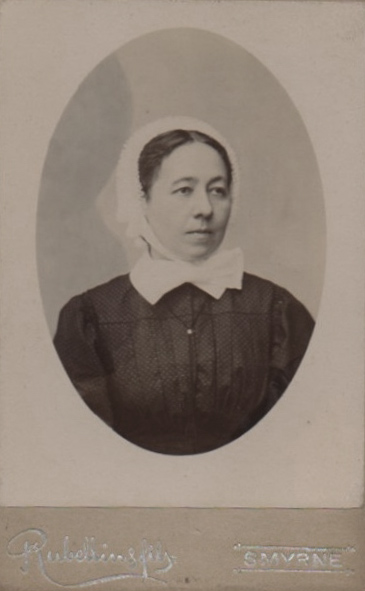
Ephemera
Rubellin photos
Very little is known about Alphonse Rubellin, and there is no mention of him in the standard bibliographies. According to editor M. Yavuz Corapcioglu the Rubellin Father and Son were of French origin and operated the Photographie Parisienne studio in Smyrna in the 1870s and 1880s. They seem to have photographed extensively throughout the Middle East, especially the region of Turkey. Most surviving prints are identified simply as ‘Rubellin et Fils’; the most informative stamp is inscribed ‘Photographie Parisienne, Rubellin Père & Fils, Rue Franque, Passage Psaro-Khan, Smyrne’ or ‘PHOTOGRAPHIE PARISIENNE / RUBELLIN / Rue Franque / SMYRNE / PASSAGE MATTHEYSZ’. There are prints by Rubellin et Fils at The American College of Greece - ACG Art and at the Gary Edwards Collection of the Getty Institute; and the Jafet Library of the American College in Beirut.

The booklet calling card of Rubellin indicating an establishment date of 1875 in Smyrna and an address on the prominent Frank Street. The ‘Parisienne’ designation maybe more for a sense of style but could also indicate he came from that city. This advertisement clearly shows him pitching for the growing tourist market, with prominent city and archaeological locations listed and also the option of dressing up in ‘local costumes’. There is a degree of valid though clearly unintentional visual recording of the archaeological locations allowing us to see some sites back then which have undergone degrees of degradation over time.

The booklet is arranged as part catalogue, part general information.

The photography business was clearly continued by at least one of his sons, Edouard.



A group of fire-fighters almost certainly attached to a foreign company providing service to its subscribers in the city.

One of the many examples of a Rubellin photo used in a postcard.
What appears to be the photo of 2 strangely dressed performers, named in the hand-written caption at the bottom, of a performance of the opera Carmen in Smyrna in 1892.










